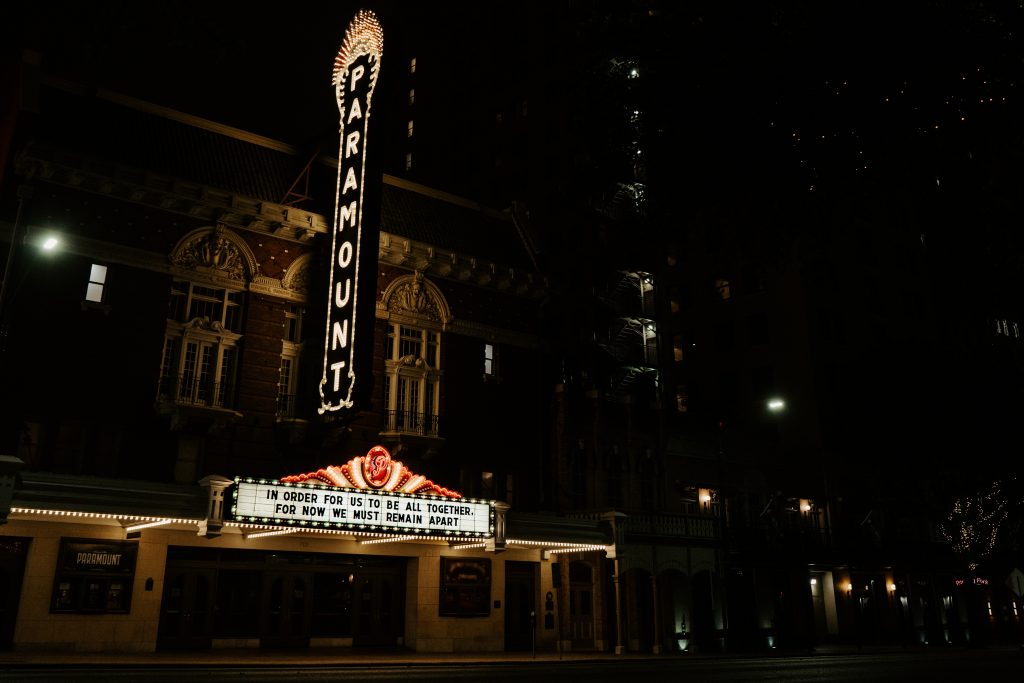Good preparation for 2020: Pickling. Buying Zoom shares. Being the kind of person who has hobbies.
Unexpectedly bad preparation for 2020: Pretty much every apocalypse movie or book.
Take Station Eleven, Emily St John Mandel’s 2014 novel about a civilisation-ending flu pandemic. It’s either exactly the thing to be reading right now, or exactly the opposite. (HBO, which has been making a miniseries of it, must be doing the same calculations.)
Station Eleven is brilliant, and chillingly believable. But like every pandemic story we tell, it’s extreme. This virus is highly transmissible, symptoms start within a few hours, and pretty much everyone who gets it is dead within a day.
The few survivors have to build something which bears no resemblance to their previous life. They look back on the age of air travel and cappuccinos and screens with overwhelming grief and not a little puzzlement.
The story follows the Travelling Symphony, a troupe of musicians and actors who, 20 years after the apocalypse, perform mostly Shakespeare in the remote hardscrabble communities that still exist in the American northeast — because “survival is insufficient”.
Most of us are not prepared
It makes sense that, when we imagine a pandemic, we opt for the most dramatic scenario. On the page or on screen, it’s just more thrilling.
But the pandemic we’re living is a different beast: it’s fatal but nowhere near universally. It’s wreaking havoc but it’s not civilisation-ending. It leaves room for haggling over which government did it better, and for think pieces of various stripes (sorry), and for truly excellent memes. We have not rehearsed this.

Real life hasn’t given us many decent templates either.
For those of us who didn’t live through World War II — probably the last time our culture imploded in more than a localised way — it’s been easy till now to assume that things will go on more or less as they usually do.
But here we are in this limbo, somewhere between civilisational collapse and “she’ll be right”.
What stories do we have to orient us? What trajectories does our situation map onto?
But there is a story most of us know
Well, how about Easter Saturday?
The non-public-holiday between Good Friday (the crucifixion) and Easter Sunday (the resurrection) doesn’t get much attention — even the Gospel accounts of Jesus kind of skip over it.
On the Friday, the would-be Messiah is brutally killed, and hurriedly laid in a tomb. Because the next day is the Jewish Sabbath, nobody’s allowed to do anything — including giving him a proper burial (sound familiar?).
There’s a pause. Jesus’ followers are scattered, in shock, in hiding. This isn’t how this was meant to go! Is everything they’ve been working for, anticipating, a bust? What happens now?
On Sunday morning, released from the Sabbath lockdown, a few women who loved Jesus go to his tomb to anoint his body.
And, according to the stories, the absolutely unprecedented has come to pass. He is not here; he is risen! Death itself, that hideous mocker, has been defeated right there in the body of the God-man.
It is the classic shock twist; the sudden and beyond-joyous reversal of fortune that Tolkien called “eucatastrophe”, good catastrophe.
The promise is that in spite of everything, the end of the arc is secure: death doesn’t win; relief and glory, and life eternal, lie ahead for all who want it.
And it offers an alternative approach
The good news of Easter is that our trajectory, personal and collective, is neither a plunge off a cliff (Station Eleven) nor a steady plateau (“she’ll be right”).
The promise is that in spite of everything, the end of the arc is secure: death doesn’t win; relief and glory, and life eternal, lie ahead for all who want it.
Julian of Norwich, the 14th-century mystic who walled herself up in a cell for perhaps 60 years, wrote that “All shall be well, and all shall be well and all manner of thing shall be well”.
From someone who lived through the Black Death (possibly losing her family to it) and severe illness herself, it’s not a glib platitude.
I suspect this champion social distancer knew something we don’t, not the other way round.
But can this message help us now?
Nobody knows how long this current crisis will last, or how bad it will get. But imagine how good it will be to wrap your grandkids in a bear hug again; to meet friends over a pint and a share platter (a share platter! golly!); to cheer in a stadium full of passionate fans just like you. The release of the first Easter was like that, only magnified immeasurably.
Right now feels like an Easter Saturday. We are shell-shocked, unmoored. Everything’s up in the air. It feels like it’s forever.
But the person who believes in Easter believes that no matter what comes at us, we’re always post-Sunday. That grief and fear don’t get the last word.
That the moral arc of the universe is long, but it was set long ago, and it’s heading towards good.
That the resurrection of Jesus was a more dramatic historical event than the largest-scale disaster, because it reveals and guarantees that arc. All shall be well, and all shall be well, and all manner of thing shall be well.
Happy Easter.
Natasha Moore is a research fellow at the Centre for Public Christianity and the author of the forthcoming The Pleasures of Pessimism.
This article first appeared at ABC News.


